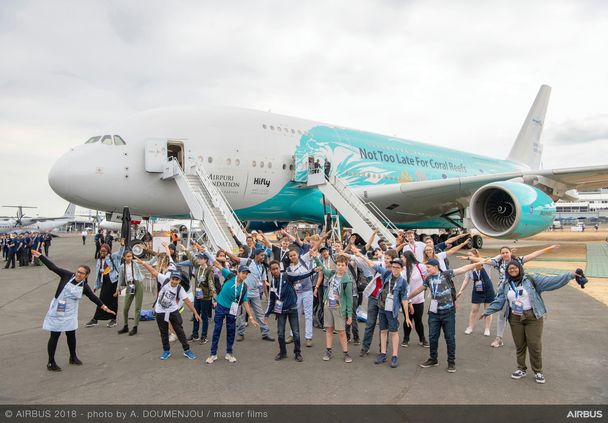Farnborough Airshow Day 5: With diversity at Airbus, ‘we make it fly’

As Airbus wraps up the business activity at this week’s Farnborough Airshow, the event’s spotlight now turns to a key element of the company’s success: its employees, and the diversity they bring to the workplace.
Diversity is a core component of the Airbus identity: more than 130 nationalities are represented and over 20 languages spoken within its operations. In ramping up production rates, opening new technological horizons for factories of the future, there is a keen awareness of how a motivated, diverse workforce can help trigger creative engagement in meeting the motto: ‘We make it fly.’
At Farnborough this week, one focus was on gender equality, particularly in increasing the number of women in the aviation and aerospace sectors. While attending the air show on 16 July, UK Prime Minister Theresa May encouraged the development of a more balanced and fair industry for women – which was followed by a formal launch of the government-backed Women in Aviation and Aerospace Charter.
Endorsing the UK’s Women in Aviation and Aerospace Charter
Airbus is one of more than 50 aerospace and aviation organisations to have endorsed the Charter as early signatories, making a public commitment to gender equality.
Among the signatories’ commitments is supporting the progression of women into senior roles by focusing on the executive pipeline and mid-tier level.
Airbus Senior Vice President Katherine Bennett said the Charter’s go-ahead is a significant milestone. “By signing the Charter, 50 UK firms are committing to driving change at all levels of our thriving sector,” she explained. “Such a widespread commitment will make a genuine difference to gender diversity in aerospace and aviation. I hope today is the beginning of seeing more women in this brilliant sector.”
Reaching the aviation and aerospace employees of tomorrow
Promoting diversity also begins with motivating the next generation of workers and managers, which is another Airbus emphasis during Farnborough with its participation in the Innovation Zone at Hall #4.
School classes have been invited to attend the air show today, and Airbus’ Innovation Zone stand has been a busy place – with youngsters able to experience how virtual reality and augmented reality are increasingly used for everything from design, development and production to maintenance.
Emily Merrison, Airbus’ Head of Education Liaison in the UK, said the virtual reality and augmented reality demonstrations underscore how digital skills are becoming increasingly important in the aviation and aerospace sectors.
Putting a name to Europe’s planetary explorer
While much attention at Farnborough is on the aircraft exhibits, space exploration also is a topic at the biennial event – including Airbus’ contributions to exploring the heavens. Today, European Space Agency (ESA) astronaut Tim Peake launched a contest to name the ExoMars Rover, which is designed and built by Airbus in Stevenage, UK for a 2021 landing on the Red Planet to perform advanced science and look for evidence of life. The naming contest is run by the UK Space Agency, with submissions accepted through 10 October.
In other activity at Farnborough, Airbus will be conducting a #WeMakeItFly photo contest this weekend, open to all aviation and aerospace enthusiasts with an eye for a well-composed image. Airbus will be awarding #MissionImpossible prizes for the best photos posted on Saturday and Sunday.
Completing the visits of VIPs to Airbus during the Farnborough Airshow was Prince Michael of Kent.
Read more about each of the days at this year’s Farnborough Airshow:
- A ‘supersized’ Airbus performance on the Farnborough Airshow’s Day 4
- A320neo Family takes centre stage during Day 3 of the Farnborough Airshow
- Farnborough Airshow Day 2: New Airbus jetliner orders, and mission training capabilities spotlighted
- Airbus flies high during the 2018 Farnborough Airshow’s opening day